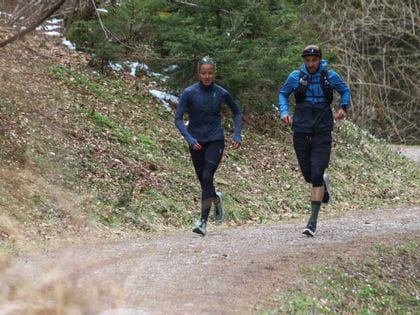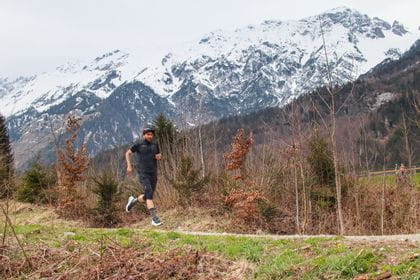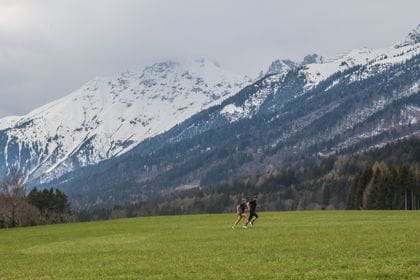Interview with two Ultra-Runners: "90 % mental and the rest is in your head"
In order to convince themselves of the qualities of the new On Cloudultra, On and Bründl Sports invited the two [HILLS] ATHLETES and long-distance runners, Heidi Schwartz and Andreas Dürr, to take on the trails of the Nordkette mountains just outside Innsbruck. Afterwards, we sat down with both of them for an interview.
What is an ultra-run?
The prefix “ultra” indicates running distances that go beyond the standard marathon, which is classically 42.195 kilometers. The most common ultra-distances are 50 kilometers and 50 miles (around 80.5 kilometers), 100 kilometers and 100 miles (around 161 kilometers). Time-defined runs (6 hours, 12 hours, 24 hours) also count as ultras. The world’s longest ultra-run is the “Self-Transcendence 3100 Mile Race”, which is held annually in New York.

HOW SHOULD SOMEONE GET STARTED IN ULTRA-RUNNING?
HEIDI: It is important to emphasize at the outset that long distances such as these can’t simply be “run”. Your bone and muscle structures all have to be prepared for the stresses you will be putting on them. That said, I would never advise anyone to take on an ultra-run within a year, that is, if they want to keep enjoying this sport long-term and not cause themselves physical harm. All good ultra-runners like Kilian Jornet, for example, have been preparing themselves for such distances for years, in some cases beginning in their childhood, meaning their bodies are able to tolerate the stresses and strains very well. If you extend your regular 5K run a little, if you run on a forest trail rather than on pavement – those are all the kinds of things that will bring you a little closer to your goal, and closer to nature in the process. I have met people who began by running 20 minutes and can now run almost two hours in the mountains, telling you with a beam in their eyes how great a waterfall or trail was, and how proud they are to have conquered a 500-meter vertical gain! The feeling of an ultra-run is indescribable – I can only speak about it in the highest possible terms. However: only after thorough and, above all, sensible preparation, so that you can keep experiencing the joys of ultra-running for many years to come.

HOW DO YOU TACKLE AN ULTRA – ABOVE ALL; MENTALLY?
ANDREAS: “Ultras are 90% mental and the rest is in your head”, that’s a popular way of describing ultras. “Ultras are just one giant eating contest, with some dumb running thrown in for laughs”, is another. I think both of those statements have a hint of truth in them. I find the complexity of an ultra-race absolutely fascinating. Every run is a unique challenge, at the start of which you can never be 100% certain what’s going to happen. A little like “a box of chocolates”. On kilometer 0, you see things a whole lot differently than you do on kilometer 100. Highs and lows are a part of the game. Ultra demands continuous recalibration and one or more strategies for pulling yourself through difficult phases. That’s when things become really interesting!
HEIDI: When you are putting so much stress on yourself for such an extended period, there are rarely days when everything goes perfectly and you don’t encounter some kind of crisis, big or small. This year, on a long run (43 km), I noticed from the outset that I was running on empty, my legs didn’t want to be there and I was fatigued in general. But at the start of the day, I told myself, I want to do this, and so I kept on running – slowly, but I kept on going nonetheless. In “moments” like those, I get into a dialogue with myself – yes, no, yes, no – but at the end, it’s always clear, I am going to keep on running, I can keep on running. As a rule, it is mainly your training sessions, where you have encountered those same barriers and continued, that give you an incredible amount of self-confidence. And before each of these long races, I ask myself how I am going to deal with tough situations. That way, in moments when things get difficult, I am not taken by surprise. I think, maybe that’s the most important thing: knowing that, at some point, it’s bound to be difficult, but also knowing that, at some point you will find some way out of that situation.

ANDREAS: At the end of the day, I think, you simply have to find the strategy that works for you personally. Some listen to music, some begin singing, others keep repeating a mantra. But in my mind, all strategies are worthless if I don’t clearly anchor in my mind beforehand why I am actually doing this. If you are asking yourself at kilometer 80 “What am I here for?”, you are actually just one stride away from quitting... Often, there’s a danger of getting lost in your own head and overdramatizing absurd things. That’s when it helps me to reduce my pace, perhaps even stop briefly, and remind myself of how damned privileged I am to be able to do something like this! There have been instances when I have broken a race down into lots of smaller stages and consciously used each stage to recall some aspect of my life for which I am truly grateful. We best perceive our emotions in a concrete context, and the feeling of determining that context for yourself is, for me, incredibly empowering …

HEIDI: Of course, there are also situations when the barrier isn’t your head, and when your body is telling you “No!” for real. If you begin losing your bearings, getting dizzy or similar symptoms, it is time to accept that you need to quit in order to avoid harming yourself further. But if ultra-running were only about negative feelings, you wouldn’t see more and more people daring to take on these longer distances. The famous “runner’s high” is for real and it really kicks in on long distances. In my case, between km 15-20, I have the feeling I could run forever. It’s like flying, with the trail in front of you and your strides happening almost automatically. It is also the highest form of happiness, when you feel one with nature – simply wonderful.
